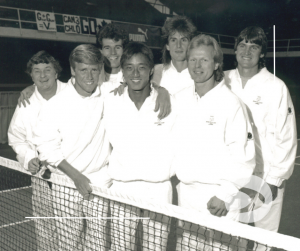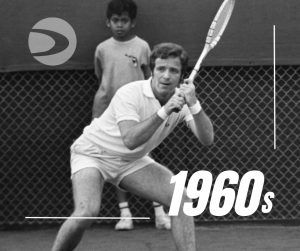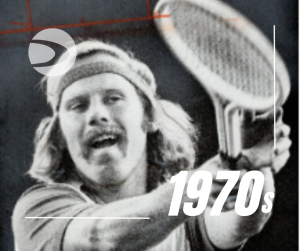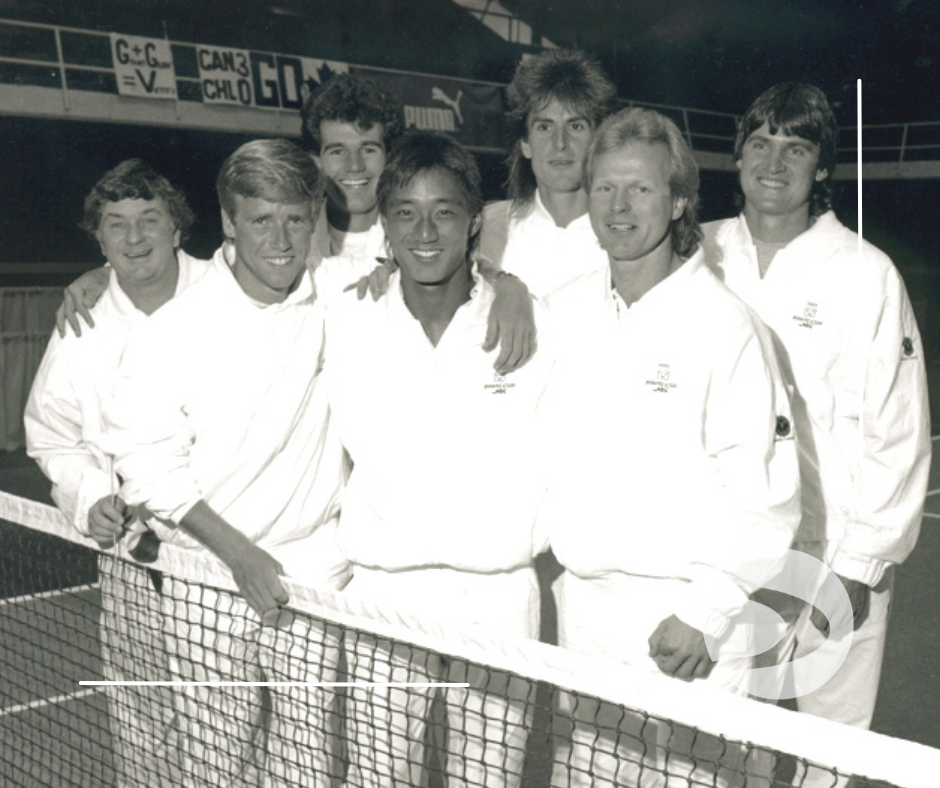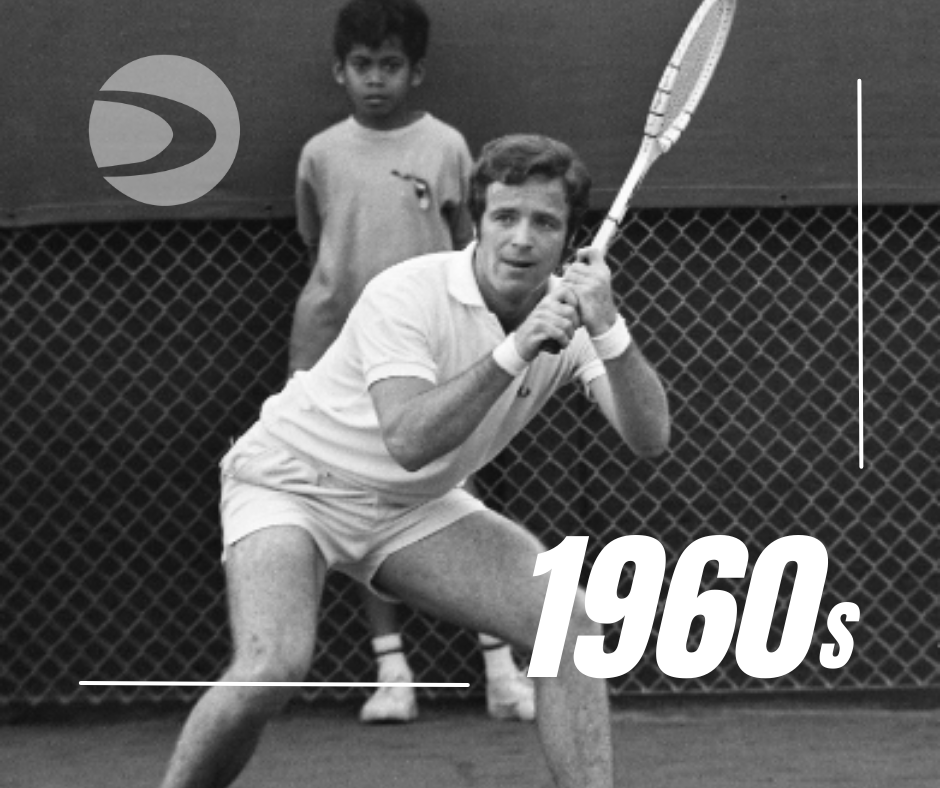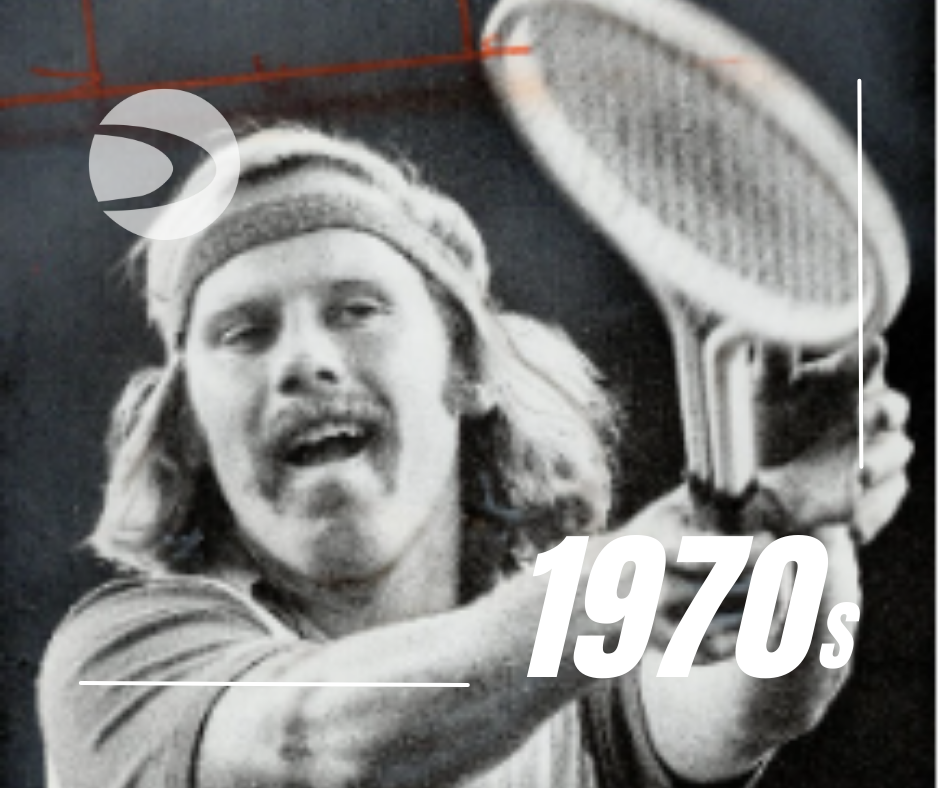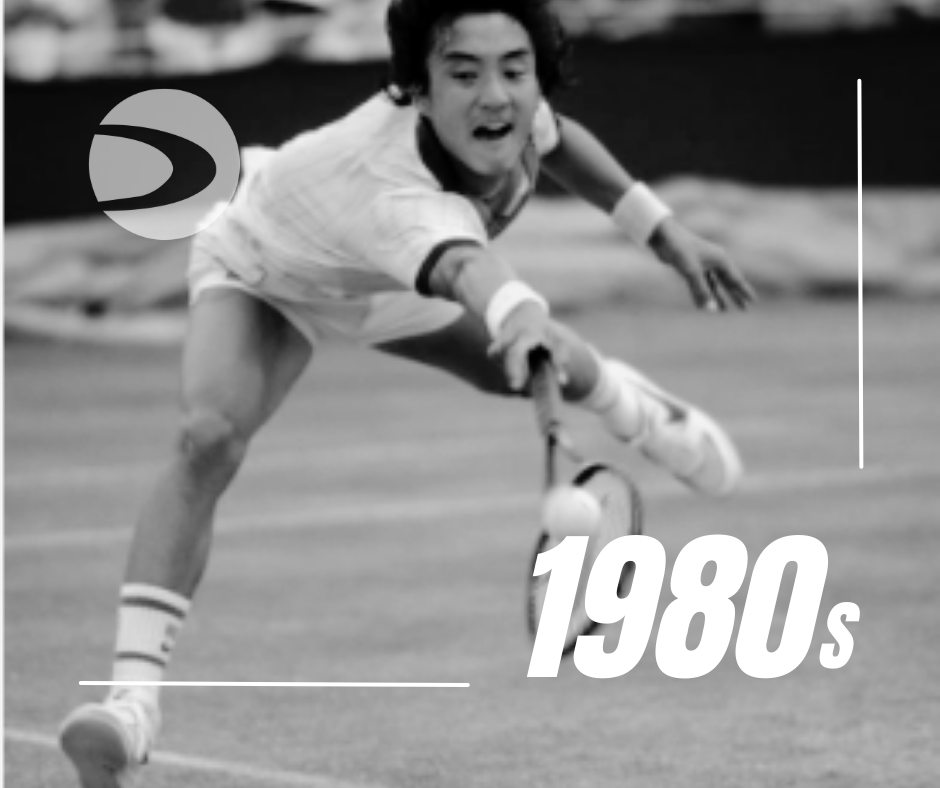Davis Cup Reflection
Robert Bettauer
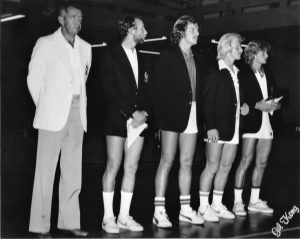
RB: Canada winning the Davis Cup for the first time in history is indeed a new high for Canadian Tennis and the achievement of a challenging vision that we boldly expressed collectively in 1988 with our first strategic plan for tennis development in the country!
Davis Cup has been the most important event and experience in my long tennis career. My parents early on instilled in me the understanding that to represent your country in Davis Cup tennis was a pinnacle of achievement and respect in our sport. I have had the distinct honour of being involved in over 60 Davis Cup Ties as a player starting in 1979, a team coach, and team manager when running Tennis Development for Tennis Canada and the past couple of decades as a broadcaster of 40+ Ties! What an emotional, exciting ride!
Too many highlights to list, so a few stand-out memories. Playing Davis Cup for the first time in Kingston, Jamaica, on a hard court so fast and shiny you could see your reflection. I know more than a few of you played on that court! It was outdoors in a field, covered with a roof. When practicing, goats would saunter in and onto the court!
Coaching and then managing the team in epic South American ties with unruly crowds, difficult conditions and often an unpredictable social environment. Some highlights here, besides some great 5 set efforts in 5th matches (Wolstenholme in Peru, Sznajder in Edmonton), included being hit in the back of the head with a rock in Paraguay and having our team escorted out of a very hostile Chilean stadium running a gauntlet of 20 armed police in 1993!
Of course, significant highlights and stepping stones to winning the Davis Cup included reaching the World Group for the first time in September 1990 with a remarkable three day performance by Grant Connell over the solid Dutch team. And spectacularly the performances by Daniel Nestor and Connell on that magical night in Vancouver in 1992 when we took a 2-0 lead over top-ranked Sweden, including that win by the rookie over number 1 in the world Stephan Edberg.
I have called so many great Davis Cup ties with standouts, including beating Spain (lights out Frank Dancevic), and then Italy (15-13 in 5th doubles win by Nestor/Pospisil) in Vancouver in 2013 to reach the Davis Cup semi-finals for the first time against the Novak Djokovic led Serbian team. Then our fantastic run in 2019, with the new format, actually making the Davis Cup final and challenging Rafa in his “House” in Spain for the title. And then the ultimate achievement this past November, winning the competition and draping our Canadian flag over the Davis Cup with incredible skill, guts and resolve led by Felix, Denis, Vasek and Captain Frank. Canadian Tennis at its best!
As I said on the final broadcast after we won the competition, “It does not take a village to win the Davis Cup. It takes a country!” We all share in this incredible accomplishment and have all played our roles in reaching this peak. Thank you all……the view at the top is great with more to come!
Big Serve, Big Forehand
Bill Cowan
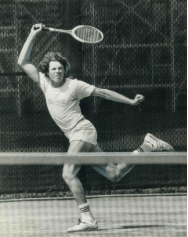 The hard-serving Cowan played four Davis Cup ties for Canada between 1982 and 1984.
The hard-serving Cowan played four Davis Cup ties for Canada between 1982 and 1984.
OC: What did you think of DC growing up as a player?
BC: When I was growing up as a young tennis player I thought of Davis Cup as a very prestigious
and special event on the same level as the Grand Slam events. To represent one’s own country
in such an event would be the highest honour as a Canadian.
OC: What do you remember from your time with the team?
BC: My most memorable moment was probably my first tie in Venezuela
watching and supporting Harry Fritz vs Jorge Andrew in a 6 hour 100 game marathon
which we won. Nobody could break serve on the fast hard courts in altitude.
OC: What do you think of Canada’s DC win?
BC: This is really a dream come true. Especially during these times when the level of tennis is so high,
and there are so many tough countries to beat. Nothing better for Canadian Tennis!
I am so proud of our team!!
The Nicest Guy
Glenn Michibata
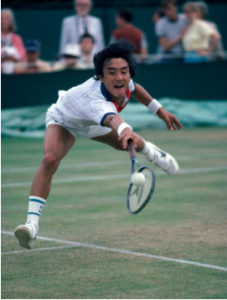 Glenn was a three-time All-American at Pepperdine University, who achieved an ATP world ranking of #48 in singles and #5 in doubles. He reached, with Grant Connell, the finals of the Australian Open and the semis of the French Open and Wimbledon. Glenn was a mainstay of Canada’s Davis Cup team, playing 14 ties between 1982 and 1992. The Connell-Michibata pair won a crucial match in 1990 against the Netherlands, contributing to Canada accessing the World Group for the first time. He is a member of the Hall of Fame of Canadian Tennis and a Rogers Cup Hall of Fame. Michibata is married and has a son and a daughter.
Glenn was a three-time All-American at Pepperdine University, who achieved an ATP world ranking of #48 in singles and #5 in doubles. He reached, with Grant Connell, the finals of the Australian Open and the semis of the French Open and Wimbledon. Glenn was a mainstay of Canada’s Davis Cup team, playing 14 ties between 1982 and 1992. The Connell-Michibata pair won a crucial match in 1990 against the Netherlands, contributing to Canada accessing the World Group for the first time. He is a member of the Hall of Fame of Canadian Tennis and a Rogers Cup Hall of Fame. Michibata is married and has a son and a daughter.
OC: What did you think of Davis Cup?
GM: The thing I would most like to go back and change in my tennis career is my Davis Cup record. It meant so much to represent Canada, and often, my performance suffered.
OC: What do you remember most of your 14 ties?
GM: My greatest memory of Davis Cup is our 1990 victory in Toronto versus the Netherlands. Grant Connell led our team the whole weekend with his courage and character. As a result we qualified for the first time for the World Group
OC: What did you think about Canada’s win?
GM: It is still hard to fully comprehend the achievement of the current Davis Cup team in bringing home the trophy. It is incredible how far tennis in Canada has come due to the hard work and excellence of the players and coaches and administrators.
Grant Connell “ Leader Extraordinaire”
By Pierre Lamarche
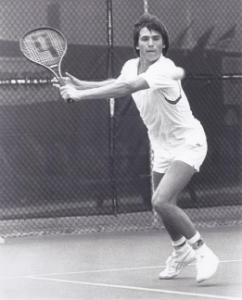 Grant might have been the most critical catalyst for Canada to achieve recognition and respect on the world scene in early 1990. He was considered one of the world’s top doubles players from the early to late -1990s, reaching the world No. 1 ATP doubles ranking in November 1993.
Grant might have been the most critical catalyst for Canada to achieve recognition and respect on the world scene in early 1990. He was considered one of the world’s top doubles players from the early to late -1990s, reaching the world No. 1 ATP doubles ranking in November 1993.
More than his performance on the court, his personality and ability to integrate with other players on tour made it possible for other ATP players and tour officials to realize that Canada was a significant player on the world scene. When I assumed the captain’s role for Canada’s Davis Cup, my role on tour was made much easier by having Grant around, as everybody knew him and respected him.
Grant became the player whose opinion often guided me in team/player decision-making. He was a no-nonsense player, thoroughly professional in approaching his career and role as our Davis Cup team leader. Often overlooked because of his success in doubles was his singles results, ATP ranked #67.
The ATP ranking does not consider achievements in his significant contribution to singles in Davis Cup play. Grant played Davis Cup for Canada on numerous occasions posting a career 15–6 win–loss record in doubles and an equally impressive 8–3 record in singles. In 1991 against Holland, Grant won both singles and doubles to make it possible for us to join the World Group for the first time in Davis Cup history. In 1992 he achieved the same performance against Cuba, making it possible for us to access the World Group a second time. Completely overlooked was his performance in 1992 in Vancouver against the defending Davis Cup champions, Sweden. Grant defeated ATP #10 Magnus Gustafson of Sweden in the first match. That win was the highest singles achievement by a Canadian in Davis Cup. Unfortunately, this great win was overshadowed by rookie Daniel Nestor, who defeated the #1 player in the world Stephan Edberg in the next match.
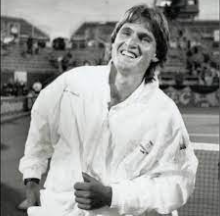 Full disclosure: Grant is one of my favourite people. His English wit, his presence, his choice of music, his opinions, his relationship with Dr. David Cox, his trusted friend and mental advisor, his first coach, Dave Johnston, a former Canadian junior champion, a personal friend who was on the Mississippi State team I coached in the 1970’, his commitment to his career and responsibilities just made him someone whom I respected tremendously. Upon retiring from the tour in 1997, Connell became the Davis Cup Captain. As captain, he led the team to the World Group for only the third time.
Full disclosure: Grant is one of my favourite people. His English wit, his presence, his choice of music, his opinions, his relationship with Dr. David Cox, his trusted friend and mental advisor, his first coach, Dave Johnston, a former Canadian junior champion, a personal friend who was on the Mississippi State team I coached in the 1970’, his commitment to his career and responsibilities just made him someone whom I respected tremendously. Upon retiring from the tour in 1997, Connell became the Davis Cup Captain. As captain, he led the team to the World Group for only the third time.
When asked about his best memory of Davis Cup, Grant answered as only Grant would: “The performance of Glenn Michibata in the doubles against Holland made it possible for me to be prepared for the next day’s deciding singles. I also believe Glenn is the most underrated player in Canada. He was the presence of Canadian tennis when I started on the ATP tour and made it easy for me to integrate”.
My favourite memory of Grant is from the same tie against Holland. Grant played Mark Koeverman #37 ATP in the final and deciding fifth match. Grant won the first two sets in tie-breakers. Canada was one set away from making Davis Cup history by reaching the World Group for the first time. The players are on serve, 3-2 in the third. Anything can happen. It’s a cold day at the national tennis centre at York, with the court prepared to play very fast. At the changeover, I reinforce to Grant that he is playing well and to follow his game plan. Then instead of answering me, he says: “Can you do me a favour and send someone to take my warm-up jacket to my father up in the stands because he looks cold.” That is Grant, the fighter with a kind heart.
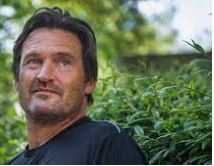 Most of us know that Grant had a stroke a few years back, leaving him with his left side paralyzed. He is coping with his debilitating injury the same way as he played, with wit and a positive attitude. In preparing this article, we spent two weeks going back and forth with my partner Doug Burke who was on tour with Grant. Our interaction was a testament to how fortunate we have lived so many great experiences and developed wonderful friendships through this great sport. When I asked him about the three initial questions for the article, he responded in typical Grant fashion: “What are the questions? Just make shit up for me. I don’t have much use of my left eye, so it’s hard to track things when I read. I thought I answered the DC stuff”. About Canada’s win, Grant answered: “I never saw a point. I’ve never met any of them. Am I proud? You bet; I wish Nestor were there as he was such a big part of the success”
Most of us know that Grant had a stroke a few years back, leaving him with his left side paralyzed. He is coping with his debilitating injury the same way as he played, with wit and a positive attitude. In preparing this article, we spent two weeks going back and forth with my partner Doug Burke who was on tour with Grant. Our interaction was a testament to how fortunate we have lived so many great experiences and developed wonderful friendships through this great sport. When I asked him about the three initial questions for the article, he responded in typical Grant fashion: “What are the questions? Just make shit up for me. I don’t have much use of my left eye, so it’s hard to track things when I read. I thought I answered the DC stuff”. About Canada’s win, Grant answered: “I never saw a point. I’ve never met any of them. Am I proud? You bet; I wish Nestor were there as he was such a big part of the success”
Grant Connell is a great person with a beautiful sense of humour. Besides selling Real Estate, his life is filled with his wife, Sarah and his five children.
Thank you, Grant for your contribution to Canada’s Davis Cup journey.
The Only Father/Son DC Appearance
Josef Brabenec JR
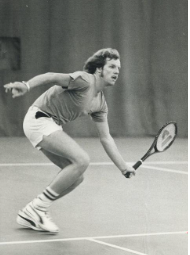
Brabenec, who was born in Czechoslovakia, won the Canadian national indoor singles championships in 1979. A left-handed player, he featured primarily in doubles while competing on the Grand Prix circuit in the 1980s. Between 1980 and 1985 he represented the Canada Davis Cup team, which for much of this time was coached by his father, Josef Brabenec Sr. In his debut tie against the Caribbean/West Indies he played and won two singles rubbers, but in his five other appearance was used as a doubles specialist.
OC: What did you think of DC growing up?
JB: Coming from the Czeck republic Davis Cup was the greatest event with the greatest players.
OC: What do you remember of your DC experience?
JB: I got to play singles in the opening singles in Kingston against Jorge Andrews who played for the Caribbean team. I lost the first set 20-18 but then won 8-6, 7-5,6-3 in five hours. What a great memory with my father, the captain sitting next to me on the bench
OC: What did the win mean to you?
JB: The Davis Cup win was a fantastic accomplishment. Vasek Pospisil was exceptional. With the format change, the last 3-4 years have provided us with a better chance of winning.
Josef Brabenec SR
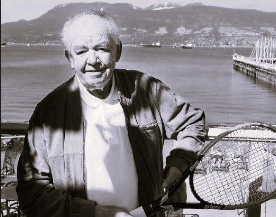 ONcourt: Originally from the former Czechoslovakia, Brabenec Sr. worked out of the Jericho Tennis Club in Vancouver prior to being appointed the first Canadian national coach in 1975. In his role as national coach, he designed both the National Coaching Certification Program and National Junior Development Program for Tennis Canada. He also helmed Canada’s Davis Cup team from 1978-1984 and its Fed Cup team from 1978-1982. Brabenec Sr. was inducted into the Canadian Tennis Hall of Fame in 2000.
ONcourt: Originally from the former Czechoslovakia, Brabenec Sr. worked out of the Jericho Tennis Club in Vancouver prior to being appointed the first Canadian national coach in 1975. In his role as national coach, he designed both the National Coaching Certification Program and National Junior Development Program for Tennis Canada. He also helmed Canada’s Davis Cup team from 1978-1984 and its Fed Cup team from 1978-1982. Brabenec Sr. was inducted into the Canadian Tennis Hall of Fame in 2000.
OC: Josef jr, your father turned 94 in January, what was his feelings on Canada’s Davis Cup win?
JB: My dad is going through some health issues but we watched all the matches on TV together and he was estatic with the result.
Man with the Huge Forehand
Derek Segal
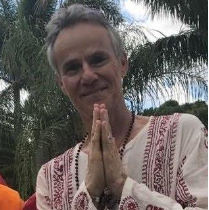
The South African born Segal played two ties for Canada. He recently moved from Florida to California.
DS: South Africa was banned from the Davis Cup due to apartheid and I don’t think I was even aware there was such a thing as Davis Cup until much later. I did hear about Davis Cup but news was limited to radio news and other news but it was limited. I grew up watching the greats playing WCT events even before ATP was a thing. I watched many Rosewall vs Laver matches, Lew Hoad, Cliff Drysdale and many other greats competing. Pancho Segura visited South Africa when I was a kid and he came over to my house and we hit for awhile, that was awesome. My best memories of being around the international tennis scene were when I was a ballboy at Ellis Park for the South African Open for players like Vilas, Drysdale, Nastase, Stan Smith, Manuel Santana, Manuel Orantes, Roscoe Tanner, Jan Kodes, Vitas Gerualitis John Newcombe and Fred Stolle. I ballboyed for women tennis players including Margaret Court, Evonne Goolagong and Billie Jean King and had a blast working the scoreboard while peering out a small opening in the sign to make sure I knew what to change the score to. When I finally did know about Davis Cup, I always aspired and hoped I could play for my country and was given the chance when my family emigrated to Canada in 1978, I always aspired to represent Canada, my new homeland, on the world stage and fortunately was given the chance in 1983 and 1984.
A vivid memory from 1983 was during the tie against Mexico in Mexico City which should have tipped me off having seen what happens in Mexicos’ bull rings because it truly was like a bullfight but we were the bulls!. My team mate, Glenn Michibata played the first singles. I felt confident as he went up 2 sets to love and the stadium directly across from our hotel was quiet as a mouse. I thought I would be going on any minute but as time went on, there was a growing wave of sound getting louder and louder with cheering and trumpeting The sound eventually reached it’s loudest climax as Francisco Maciel won the next 2 sets and play was called for the day due to waning light. The next day Glen unfortunately went down and when I took the court against Jorge Lozano, the fans were already in a frenzy, smelling victory and loudly trumpeting and throwing confetti around even whenever I hit a shot out or served a fault. Unfortunately it did not go well but that is not my take away from playing Davis Cup for Canada.
What I enjoyed most about Davis Cup was being a part of a team rather than playing as an individual. I also got a kick out of helping my fellow teammates, cheering them on whenever needed as we pushed towards our common goal for our country together. Representing Canada as an ambassador was a fantastic opportunity to compete for Canada as a Canadian. Davis Cup is virtually the only opportunity a player has to play with and for a team of brothers that are there for you no matter the circumstance only wanting the best for you in every way.
Kudos as well to our esteemed leader, Josef Brabenec Sr, who I believe is well into his 90’s and who did a great job with getting us prepared for the match. One other tidbit was that happened during the players dinner the night before the tie. The Mexican coach, Raul Ramirez’s wife, Miss Universe, was seated across the table from us and in pictures from that night, I think a few of us were gawking at her instead of focusing on the dinner party. Maybe the Mexican team did this on purpose to grab our attention away from the task at hand!
I am in awe of how far Canada has come over the years by winning this prestigious event on the international stage, proving to the world that Canada can indeed play and win at the highest levels. Canada I am certain will continue to win Davis Cup competitions as the program expands with new talent spurred on by this win by these amazing talented young players. I am extremely proud to have been a part of the Canadian Davis Cup program and congratulate this Canadian team for their accomplishment that will only help Canada to continue as a force to be reckoned with as they surely win many future events across the globe.
Tennis Family Royalty
Mark Greenan
Mark Greenan was an All American at Wake Forest University. The leftie from Cambridge, Ontario played on Canada’s Davis Cup team from 1985 to 1987. Mark comes from an extensive Canadian tennis family.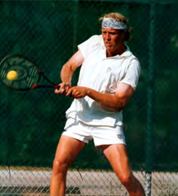
OC: Growing up, what did Davis Cup mean to you?
MG: What I remember about Davis Cup growing up were the stories of what seemed to be like war stories about Canada vs. Mexico and Columbia, which were fascinating and to be honest, a little scary.
OC: Your memory of Davis Cup?
MG: Which leads me into a funny story about my first Davis Cup Tie. It against, Mexico, and when I was asked to represent Canada, I said, no, lol. Remembering the war like stories from the past Ties, I wasn’t sure I was the guy for the job. Well, I was talked into it by John McManus, and it was a memory for a lifetime playing for Canada with Glenn Michibata and winning a close straight sets win 9-7, 9-7, 6-4.
OC: What did you think of Canada’s win?
MG: Seeing Canada win the Davis Cup it was truly inspiring, an amazing accomplishment and definitely the talk of the Canadian Tennis world and noticed by all Canadians. Makes you proud of the boys and how far Canadian Tennis has come along, and the whole world has taken notice.
I heard that they were going to take the Davis Cup Trophy on a trip across Canada to different cities, schools, and tennis clubs, what a great idea to build on this win for the future! Go CANADA!
Longest Match 100 Games
Harry Fritz
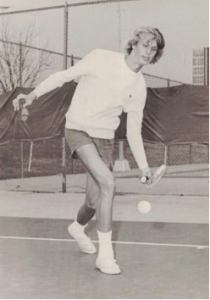 Harry was a left-handed serve and volley player, born in Yuma, Arizona and played collegiate tennis for East Texas State. He was a member of the university’s 1972 NAIA championship team, and also won the singles and doubles individual titles. While based in Toronto, he married and became eligible to represent Canada while being the top-ranked Canadian. In 1982 he appeared in three Davis Cup ties for his adoptive country.
Harry was a left-handed serve and volley player, born in Yuma, Arizona and played collegiate tennis for East Texas State. He was a member of the university’s 1972 NAIA championship team, and also won the singles and doubles individual titles. While based in Toronto, he married and became eligible to represent Canada while being the top-ranked Canadian. In 1982 he appeared in three Davis Cup ties for his adoptive country.
His brother Guy Fritz was also a professional tennis player and is the father of Harry’s nephew Taylor Fritz one of the top ATP players from the US.
OC: How did you feel about playing Davis Cup for your adoptive country?
It was an honour, especially as I was never sure I would qualify for being born in the US.
OC: What sticks out?
This has to be the longest [100 game] rubber match I won against Jorge Andrew of Venezuela in January of 1982 in Caracas, 16–14, 11–9, 9–11, 4–6, 11–9.
OC: What do you think about Canada’s win?
Incredible, the people in charge certainly changed things around.
Highest Win Against ATP Player in Davis Cup
Doug Burke
In 1992, in Melbourne at the Australian Open, taking care of the Canadian players, I travelled and roomed with a young 19-year-old, Daniel Nestor, and for various factors, the most important one being that world #1 Stefan Edberg from Sweden, had lost 5 matches indoor against a lefty. This, coupled with Daniel qualifying for the Open, provided the impetus for him [#220 ATP] to be considered for singles play. We knew Sweden would be overconfident, which showed in their preparation. Hence, our management team decided to have Daniel train off-site so the Swedes would not only be surprised by his nomination but also never have seen him play. Doug Burke, the calm Rasta man, as Daniel would call him, was the perfect match to prepare Daniel for his unbelievable performance. He beat #1 Edberg in 5 sets and lost in the fifth set of the fifth match to Magnus Gustafson #10 ATP. 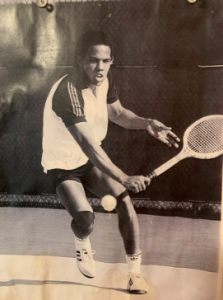
OC: What is your relationship with Davis Cup?
DB: Having been involved in Davis Cup for thirty years – in various capacities (player/ playing captain/ non-playing captain/ coach), for both Jamaica/the Caribbean and Canada, I realize how integral Davis Cup has been in my tennis career.
I regard representing one’s country as one of the highest honours an athlete can experience – so the memories created through Davis Cup have left an indelible mark on me.
DB: Your favorite Canadian memory?
DB: Pierre Lamarche (Davis Cup Captain at the time) asked me to serve as an Assistant Coach in Canada’s 1992 Davis tie versus the tennis powerhouse Sweden. I was excited about the opportunity to be a part of it. I was assigned the role of helping to prepare the young Daniel Nestor- and diligently tried to do so under the guidance of Pierre and Louis Cayer (Davis Cup Head Coach). Daniel had an epic victory over Stefan Edberg (#1 in the world at the time) – and although I couldn’t stay for the completion of the tie (Canada lost 3-2 in a nail-biter); that experience was instrumental in demonstrating to me the incredible value of teamwork.
OC: What about Canada’s win?
DB: Canada’s Davis Cup World title is the most outstanding achievement for a country in tennis, and I think it is one of the most significant in all of sport. I sincerely congratulate not only the current team members, support personnel, and Tennis Canada; but all the players and people that have played a part in Canada’s Davis Cup participation over the years – and thereby have enabled the vision and contributed to this victory.
80 ties as Player and Captain
Martin Laurendeau
Marty was an All-American at Pepperdine Univ. from 1983-1987. He reached an ATP high of #90, 4th round of the US Open, 3rd round at Wimbledon and participated in the Olympics as a player in Seoul ’88. He represented Canada in Davis Cup for 8 years ’86-’93. He was the Davis Cup coach for 11 years and Davis Cup Captain for 14 years. He participated in 4 Olympics as a coach, Athens, Beijing, London, Rio.
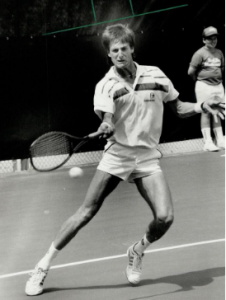
OC: It is obvious of your love for Davis Cup, what are your strongest memories of your 33 years with the team?
ML: Many, many memories from some 80 Ties or so. The strongest one is are in 2011 when we qualified for World Group through 3 away Ties (Mexico, Ecuador and Israel), and since never looked back as we have been World Group team since.
Amongst them in Guyaquil, Ecuador when after being down 2-0 we came back and won, Philip Bester playing with a stress hand fracture and cramps in the last rubber, which he bravely clinched, amidst a gun exchange between rival gang members in attendance in the crowd as fans and teams were seeking shelter as bullets were fired about! The play was interrupted for 45 min. Wild weekend!
For so many years trying to just qualify for the World Group, and after 36 years of waiting for a title, seeing the boys lift the biggest trophy in Sports was surreal. When I think of all the former players, coaches, Captains and staff, of Tennis Canada who invested so much of their time and passion with the goal and belief, despite so many attempts and failures, that one day we will win it all, my eyes well up with great pride and relief that the Mission as finally been accomplished. This country should be proud, enjoy and celebrate the long and arduous road that has led to being World Champions.

